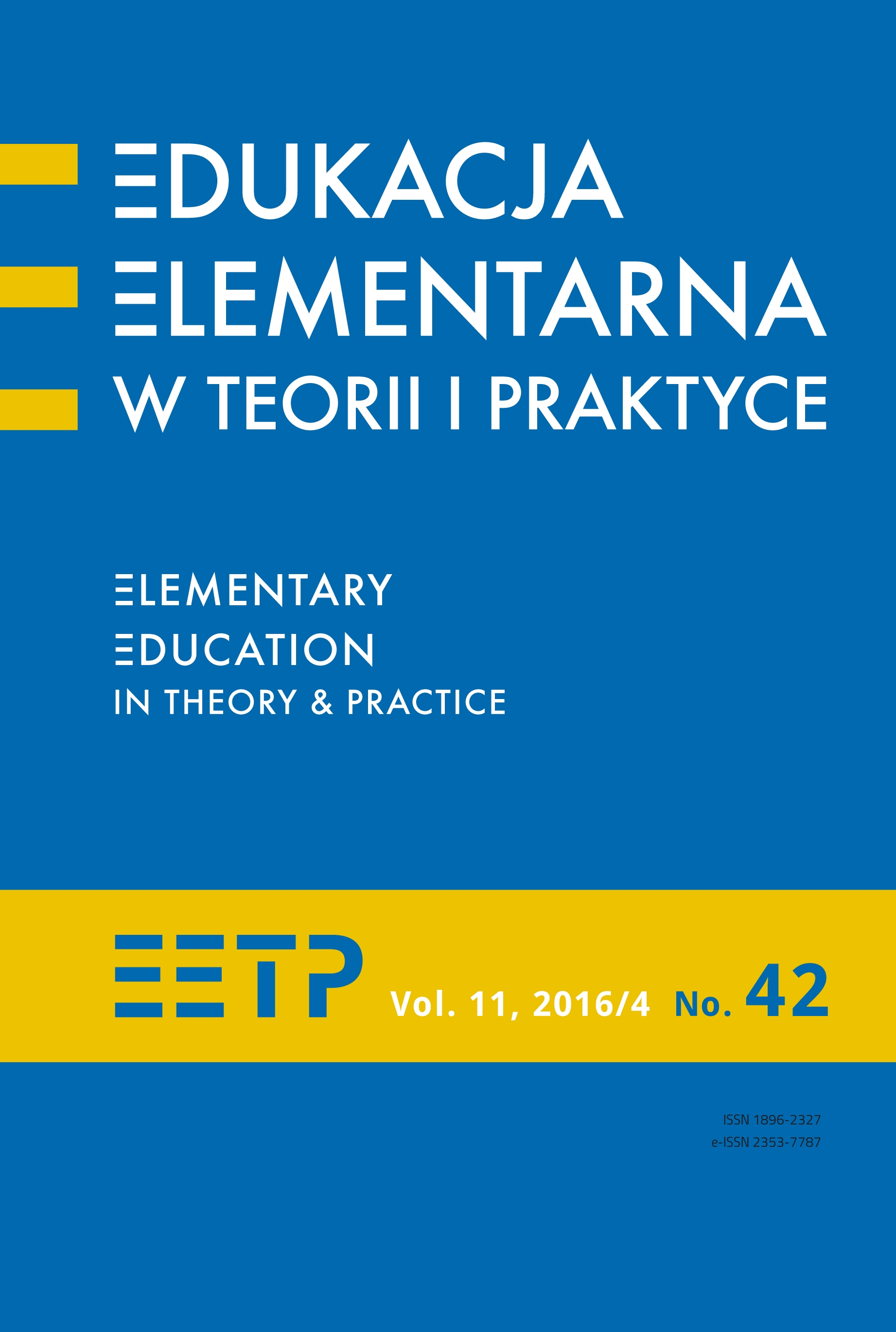Od gier terenowych po larpy, czyli pedagogika przygody w procesie edukacji i socjalizacji odbiorców w różnych grupach wiekowych
Abstrakt
Tekst ma na celu prezentację doświadczeń zebranych podczas realizacji modułu fakultatywnego pt. Pedagogika przygody, w którym uczestniczyli studenci pedagogiki na Wydziale Pedagogiki i Psychologii Uniwersytetu Śląskiego. Zaprezentowane zostaną również wyniki pilotażowych badań ankietowych dotyczących pedagogiki przygody i gier terenowych, przeprowadzonych wśród studentów. W tekście znajdzie się także odniesienie do metody pracy o nazwie live action role-playing (larp). Zaprezentowane zostaną wyniki badań pilotażowych z zastosowaniem larpów, przeprowadzonych w klasie pierwszej szkoły podstawowej w Piekarach Śląskich. Głównym celem badań była weryfikacja założenia, że gra fabularna w postaci live action role-playing, oparta na autorskim scenariuszu, wpływa na integracje dzieci w wieku wczesnoszkolnym. Zastosowano metodę quasi-eksperymentu pedagogicznego oraz studium przypadku. Podjęte działania polegały na poprowadzeniu larpa z grupą dzieci, które są na etapie wzajemnego poznawania się. Zastosowano technikę obserwacji skategoryzowanej. Studium przypadku zostało uzupełnione swobodną rozmową z poszczególnymi dziećmi. Do przeprowadzenia badań skonstruowano autorskie narzędzie pt. Arkusz obserwacji integracji grupowej oraz autorski scenariusz live action role-playing pt. W Baśniowej Krainie. Na podstawie przeprowadzonych badań można stwierdzić, że live action role-playing w pracy z grupą pomagają odpowiednio zbudować jej strukturę i wspierają kształtowanie się pozytywnych relacji w grupie. Larp umożliwia przeżywanie, doświadczenie i poznanie, co z kolei pozwoliło uczestnikom gry zacieśnić istniejące między nimi relacje.
Bibliografia
Domagalski D., Wartość dodana w LARP-ach, [w:] LARP. Twarze i maski, red. K. Chmielewski, Gdański Klub Fantastyki, Gdańsk 2013.
Gass M., Transfer of learning in Adventure Education, [w:] Adventure Education, red. J. Miles, Venture Publishing, S. Priest 1990.
Labenz P., Zagrajmy bez mechaniki, [w:] Konferencja LARPowa 14-15 stycznia 2012, red. J. Tabisz, Stowarzyszenie Wielosfer, Wrocław 2012.
Leśny A., Doświadczenia nauki i przygody na żaglowcach szkoleniowych, [w:] Edukacja przygodą. Outdoor i Adventure Education w Polsce: teoria, przykłady, konteksty, red. E. Palmer-Kabacińska, A. Leśny, Fundacja Pracownia Nauki i Przygody, Warszawa 2012.
Leśny A., Pedagogika przygody – konteksty teoretyczne, [w:] Przygoda w edukacji i edukacja w przygodzie, red. A. Bąk, A. Leśny, E. Palmer-Kabacińska, Fundacja Pracownia Nauki i Przygody, Warszawa 2014.
Michl W., Pedagogika przeżyć, tłum. D. Kozieł, Wydawnictwo WAM, Kraków 2011.
Palmer-Kabacińska E., Edukacja przygodą a harcerstwo – (nie) znane i (czy) zapomniane, [w:] Przygoda w edukacji i edukacja w przygodzie, red. A. Bąk, A. Leśny, E. Palmer-Kabacińska, Fundacja Pracownia Nauki i Przygody, Warszawa 2014.
Szkoła Aktywnego Wypoczynku „Frajda”, Edukacja typu outdoor: co to jest?, ‹http://www.frajda.com.pl/outdoor-2/outdoor-education-co-to-jest› (dostęp: 19.10.2016).
Średnicka J., Wrona A., Gry i symulacje szkoleniowe i ich zastosowanie w edukacji młodzieży i ludzi dorosłych, [w:] Przygoda w edukacji i edukacja w przygodzie, red. A. Bąk, A. Leśny, E. Palmer-Kabacińska, Fundacja Pracownia Nauki i Przygody, Warszawa 2014.
Tabisz J., Leksykon Pojęć, [w:] Konferencja LARPowa 14-15 stycznia 2012, red. J. Tabisz, Stowarzyszenie Wielosfer, Wrocław 2012.
Ukens L., Training games, [w:] The Handbook of Experiential Learning, red. M. Silberman, J. Wiley-Sons, San Francisco 2007.
Ziętkiewicz E., Integracja w edukacji wczesnoszkolnej, Polski Dom Wydawniczy „Ławica”, Poznań 1997, s. 24-27.
Zioło B., Flamingi i pingwiny, [w:] KOLA -Konferencja LARPowa 11-13 stycznia 2013, red. J. Tabisz, Stowarzyszenie Wielosfer, Wrocław 2013.
Copyright (c) 2016 Edukacja Elementarna w Teorii i Praktyce

Utwór dostępny jest na licencji Creative Commons Uznanie autorstwa – Bez utworów zależnych 4.0 Międzynarodowe.
1. Autor zgłaszając swój artykuł oświadcza, że jest Autorem artykułu (zwanego dalej Utworem) i:
- przysługują mu wyłączne i nieograniczone prawa autorskie do Utworu,
- jest uprawniony/a do rozporządzania prawami autorskimi do Utworu.
Oświadcza, że nie narusza praw autorskich osób trzecich i praw prawnych.
Oświadcza, że nie występuje żaden konflikt interesów.
2. Udziela Uniwersytetowi Ignatianum w Krakowie nieodpłatnej, niewyłącznej, nieograniczonej terytorialnie licencji do korzystania z Utworu na następujących polach eksploatacji:
- utrwalania utworu w formie papierowej, a także na nośniku cyfrowym lub magnetycznym;
- zwielokrotnienia utworu dowolną techniką, bez ograniczenia ilości wydań i liczby egzemplarzy;
- rozpowszechniania utworu i jego zwielokrotnionych egzemplarzy na jakimkolwiek nośniku, w tym wprowadzenia do obrotu, sprzedaży, użyczenia, najmu;
- wprowadzenia utworu do pamięci komputera;
- rozpowszechniania utworu w sieciach informatycznych, w tym w sieci Internet;
- publicznego wykonania, wystawienia, wyświetlenia, odtworzenia oraz nadawania i reemitowania, a także publicznego udostępniania utworu w taki sposób, aby każdy mógł mieć do niego dostęp w miejscu i czasie przez siebie wybranym;
- w zakresie praw zależnych do Utworu, obejmujących w szczególności prawo do dokonania koniecznych zmian w Utworze, wynikających z opracowania redakcyjnego i metodycznego, a także do dokonania tłumaczenia Utworu na języki obce.
Udzielenie licencji następuje z chwilą przekazania Utworu na rzecz Uniwersytetowi Ignatianum w Krakowie. Uniwersytet Ignatianum w Krakowie jest uprawniony do udzielania dalszych sublicencji do Utworu, w zakresie udzielonego prawa. Licencja jest ograniczona czasowo i zostaje udzielona na okres 15 lat, licząc od daty jej udzielenia.
Wyraża się zgodę i zachęca autorów do publikacji ich tekstu w Internecie (np. w repozytorium instytucji lub na jej stronie internetowej) przed lub podczas procesu składania tekstu jako, że może to prowadzić do korzystnych wymian oraz wcześniejszego i większego cytowania opublikowanego tekstu (Patrz The Effect of Open Access). Zalecamy wykorzystanie dowolnego portalu stowarzyszeń badawczych z niżej wymienionych:




